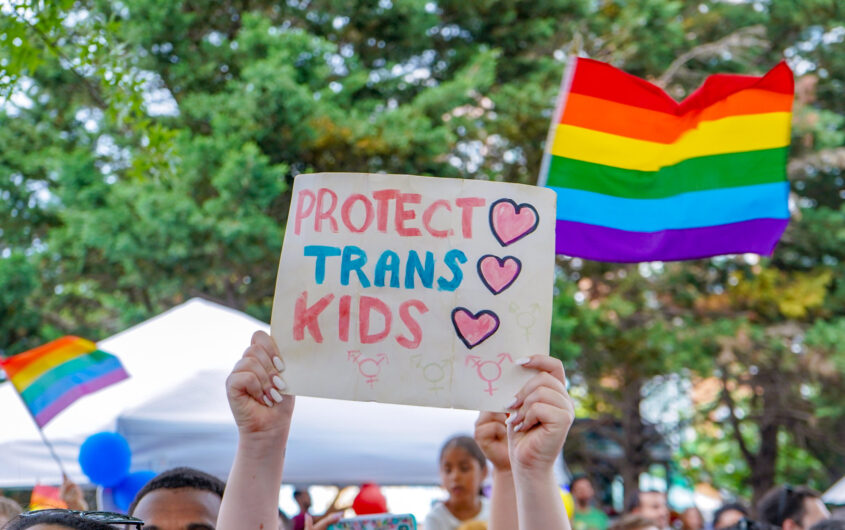
Ted Eytan via Flickr
Trending Now: Queerphobia

Christoph Mayer
German Bundestag
Christoph Mayer is currently working as a policy advisor to a member of the German parliament. Topics he has worked on include data governance, transatlantic relations, and the intersection between digitalization and democracy. He previously worked as a research fellow in the Technology and Global Affairs Program at the German Council on Foreign Relations (DGAP) and as a project manager at Heinrich-Böll-Stiftung.
With a Master's degree in war and conflict studies from the University of Potsdam and the Universidad Autónoma in Madrid, his academic journey included working visits to the German Embassy in Washington D.C. and the Foreign Office headquarters in Berlin, along with a year abroad at National Chengchi University in Taiwan. His analytical approach to current political developments is marked by his advocacy for critical, class-conscious, and intersectional perspectives. He strives to forge inclusive spaces that foster active solidarity among marginalized groups, with a vision of shaping a (digital and analog) future that is more equitable for all.

Mieko Kuramoto
Office of Congressman Mark Takano (CA-39)
Mieko Kuramoto is a Legislative Assistant in the office of Congressman Mark Takano (D-CA-39). Originally from Milwaukee, Wisconsin, Mieko came to Congress through the Asian Pacific American Institute for Congressional Studies (APAICS) Fellowship Program and is in her third year with the office. Her portfolio includes healthcare, oversight and government reform, agriculture and nutrition programs, financial services and housing, tribal affairs, and LGBTQ issues. Mieko is a graduate of Smith College and organized in the Asian American Pacific Islander (AAPI) community prior to coming to the Hill. Her work with AAPI groups has spanned both the academic and the advocacy spheres, including research on data collection and disaggregation, voting access, and organizing techniques as well as direct advocacy work with Japanese American youth groups and other AAPI political organizations.
Decoding the Role of Trans- and Homophobic Narratives for Right-wing Online Mobilization in the United States and Germany
When a group of prominent politicians from the German CSU party convened with Florida Governor Ron DeSantis in May 2023, it sent shockwaves through the queer community in Germany. DeSantis has drawn significant attention for his staunchly anti-LGBTQ+ stance and the implementation of laws curtailing minority rights in his home state. Florida has been leading the nation in their restriction of LGBTQ+ rights across the education and healthcare sectors, and with his run for president, DeSantis has brought his message to the national stage.
While this meeting garnered significant attention, the transatlantic networking of right-wing movements has existed for years and exploded in growth with the proliferation of social media. In today’s global landscape, the intertwining of right-wing groups in the United States and Germany reveals an alarming interconnectedness—and as anti-gay and anti-trans rhetoric continues to gain political traction in both countries, the similarities merit highlighting.
Background: Roots of the 2020 anti-LGBTQ+ Movement Worldwide
Donald Trump’s 2016 campaign put a name and a platform to the “Make America Great Again” ideology. Based on the premise that the United States is weakened because of social progressivism—among these, the greater societal acceptance of the LGBTQ+ community—conservative activists and politicians alike painted progressive societies as an attack on traditional gender roles, the family unit, and patriotic values. In particular, conservative activists singled out transgender identity as proof of the ills of society.
The narrative that conservative activists and politicians have spun on this issue is nothing new—it was practically the same blueprint used by anti-gay activists in the 1970s. Singer-turned-conservative activist Anita Bryant, arguably the most recognizable anti-gay activist of the 1970s and 80s, crusaded under the slogan “Save Our Children” and argued that lesbians and gays sought to recruit and pervert young children. Nearly the exact slogan has risen again in popularity and usage among the modern political right, based on underlying theories that “transgenderism” is a social contagion and that transgender adults—and, by extension, other members of the LGBTQ+ community and their supporters—are pushing a radical liberal agenda intended to sexualize children.
On both sides of the Atlantic, coordinated online campaigns orchestrated by right-wing extremists frequently intensify anti-LGBTQ+ rhetoric.
This strategy has proven to be extremely politically expedient. It has galvanized the American conservative political base at the most local levels and led to the introduction of hundreds of anti-LGBTQ+ bills. This ideological framework has reverberated politically worldwide as right-wing groups often share ideological roots in conservative beliefs and religious convictions. Though their tactics and influences vary between countries, the shared global platform of social media significantly amplifies the dissemination of their ideas and strategies.
Coordinated Campaigns: From #StolzMonat to the Backlash against Bud Light
On both sides of the Atlantic, coordinated online campaigns orchestrated by right-wing extremists frequently intensify anti-LGBTQ+ rhetoric. One stark instance emerged in Germany with the #StolzMonat campaign. Deliberately melding anti-LGBTQ+ sentiment with nationalism, the campaign aimed to disrupt LGBTQ+ discourse on Twitter (now X) during Pride Month 2023. Using #StolzMonat as a parallel to “pride month,” the campaign encouraged users to overlay their profile pictures with shades resembling the German flag instead of the traditional rainbow hues. Simultaneously, the campaign fostered intimidation, leading to online harassment of politicians and queer activists who prominently displayed the rainbow flag as a symbol of LGBTQ+ pride.
In the United States, the posting of a single promotional video by transgender TikTok influencer Dylan Mulvaney of the beer Bud Light set off a social media firestorm that led to a significant drop in sales, a slew of openly anti-trans commentary from celebrities and politicians, and widespread media coverage for months. Videos circulated online of right-wing individuals violently destroying cases of Bud Light while politicians openly called for a boycott of the product, using the hashtag #GoWokeGoBroke. The impact of that boycott caused sales to plummet by double-digit percentages.
Although companies make advertising with diverse subjects a standard practice, the speed at which the boycott was organized and had an impact is a testament to the disturbing lightning rod that transgender identities have become. Social media has become a vehicle by which nationalistic and supremacist views disseminate rapidly, misinformation catches quickly, and localized campaigns spread globally.
Drag Panic Online: Right-Wing Mobilization in the United States and Germany
Another prevalent online strategy among right-wing groups in the United States involves targeting drag queens. Drag events have become focal points for right-wing mobilization. Far-right online actors like “Libs of TikTok” mobilize their online audience by framing these events as threats to family values and moral integrity, garnering support against what they perceive as challenges to established norms. This mobilization has even spurred legislative endeavors in the United States, with states like Tennessee, Texas, and Montana attempting to pass laws specifically prohibiting drag performances in select public spaces.
Although German drag culture lacks the same mainstream visibility as in the United States, similar narratives have emerged online, framing drag as inherently sexual and claiming that children are being subjected to sexual abuse. This has triggered debates among right-wing politicians and led discussions about prohibiting drag show story times at public libraries in Bavaria.
Outcomes of anti-LGBTQ Political Mobilization
Corporate backlash and drag bans are just two of a broad field of examples. Across the Atlantic, the right has used anti-gay and anti-trans campaigns as a method of taking aim at education systems, comprehensive sex education, the rise of LGBTQ+ content in books and media, the expansion of gender norms, and a generalized greater societal acceptance of the LGBTQ+ community.
The interconnectivity of these anti-LGBTQ movements emphasizes the need for collaborative counter-efforts transcending borders.
These trends have an extremely tangible impact: in this year alone in the United States, over 500 anti-LGBTQ+ bills have been introduced at the state and federal levels and 84 have passed into law, restricting everything from LGBTQ+ content in the classroom to the participation of transgender athletes in sport and access to gender-affirming care. Young transgender people in the United States are under enormous pressure from entire legislative bodies, and it is making every aspect of life—from healthcare to education to simply existing in public spaces—a serious and sometimes life-threatening challenge.
Countering Queerphobic Online Content
To counter the proliferation of hate-driven narratives against the LGBTQ+ community online, several crucial steps can be taken to disrupt their influence. Firstly, it is imperative not to engage or amplify these narratives—a principle often encapsulated in the adage “Don’t feed the trolls.” Withholding attention from these narratives minimizes their impact and diminishes their platform.
Secondly, solidarity stands as a potent tool against anti-gay activists’ divisive agenda. Recognizing their intent to sow discord, standing united weakens their efforts. Refusing to be fractured by their tactics bolsters collective resilience against their harmful narratives. Unity within the LGBTQ+ community and in the progressive movement in general is especially crucial during these challenging times.
Finally, the interconnectivity of these movements emphasizes the need for collaborative counter-efforts transcending borders. Hence establishing transatlantic bridges for the LGBTQ+ community holds immense importance. Projects such as AGI’s “Building LGBTQ+ Communities in Germany and the United States” foster mutual understanding, identify shared tactics, and facilitate the exchange of effective countermeasures.
The surge in hate and extremism poses an existential threat to human rights and democratic freedoms in both the United States and Germany. Combating queerphobic narratives is an integral step toward safeguarding these fundamental values across borders, securing a future where diversity is celebrated, and ensuring that individuals, irrespective of their gender identity or sexual orientation, can thrive in a world free from discrimination and prejudice.
This article is part of the project “Building LGBTQ+ Communities in Germany and the United States: Past, Present, and Future” and is generously funded by the Transatlantik-Programm der Bundesrepublik Deutschland aus Mitteln des European Recovery Program (ERP) des Bundesministeriums für Wirtschaft und Klimaschutz(BMWK) (Transatlantic Program of the Federal Republic of Germany with Funds through the European Recovery Program (ERP) of the Federal Ministry for Economics and Climate Action (BMWK)).








